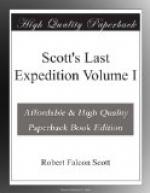At one time it was suggested that the hut should be placed on this Tongue. What an adventurous voyage the occupants would have had! The Tongue which was 5 miles south of C. Evans is now 40 miles W.N.W. of it.
From the Glacier Tongue we still pushed north. We reached Dunlop Island on the 24th just before the fog descended on us, and got a view along the stretch of coast to the north which turns at this point.
Dunlop Island has undoubtedly been under the sea. We found regular terrace beaches with rounded waterworn stones all over it; its height is 65 feet. After visiting the island it was easy for us to trace the same terrace formation on the coast; in one place we found waterworn stones over 100 feet above sea-level. Nearly all these stones are erratic and, unlike ordinary beach pebbles, the under sides which lie buried have remained angular.
Unlike the region of the Ferrar Glacier and New Harbour, the coast to the north of C. Bernacchi runs on in a succession of rounded bays fringed with low ice walls. At the headlands and in irregular spots the gneissic base rock and portions of moraines lie exposed, offering a succession of interesting spots for a visit in search of geological specimens. Behind this fringe there is a long undulating plateau of snow rounding down to the coast; behind this again are a succession of mountain ranges with deep-cut valleys between. As far as we went, these valleys seem to radiate from the region of the summit reached at the head of the Ferrar Glacier.
As one approaches the coast, the ‘tablecloth’ of snow in the foreground cuts off more and more of the inland peaks, and even at a distance it is impossible to get a good view of the inland valleys. To explore these over the ice cap is one of the objects of the Western Party.
So far, I never imagined a spring journey could be so pleasant.
On the afternoon of the 24th we turned back, and covering nearly eleven miles, camped inside the Glacier Tongue. After noon on the 25th we made a direct course for C. Evans, and in the evening camped well out in the Sound. Bowers got angles from our lunch camp and I took a photographic panorama, which is a good deal over exposed.
We only got 2 1/2 miles on the 26th when a heavy blizzard descended on us. We went on against it, the first time I have ever attempted to march into a blizzard; it was quite possible, but progress very slow owing to wind resistance. Decided to camp after we had done two miles. Quite a job getting up the tent, but we managed to do so, and get everything inside clear of snow with the help of much sweeping.




